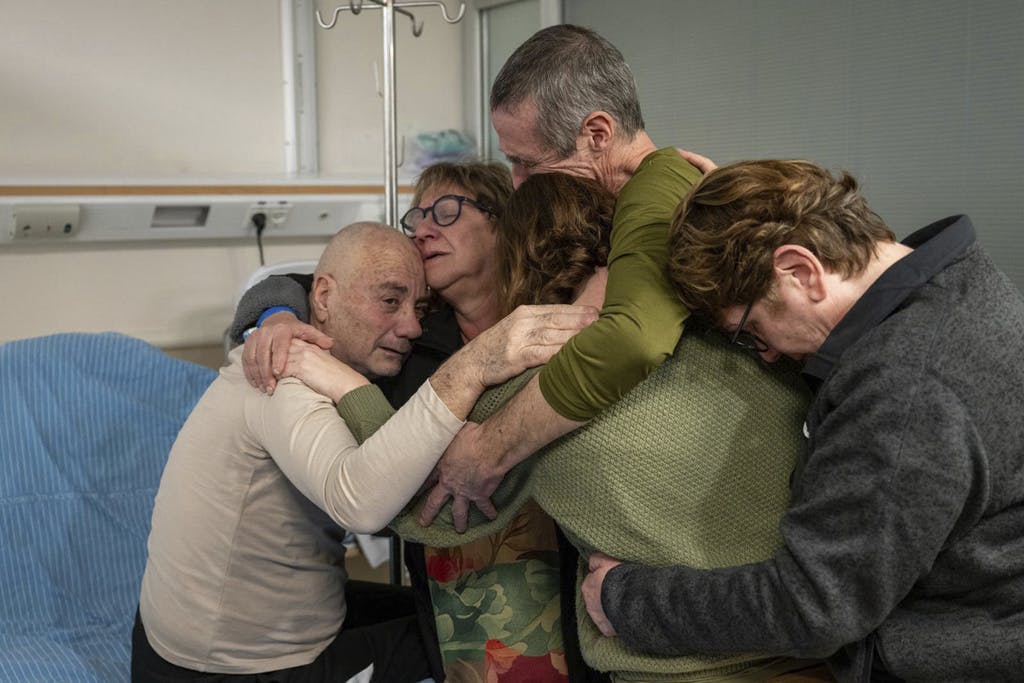Daring Israeli Rescue Operation at Rafah Could Be Turning Point in War With Hamas
Even as diplomacy intensifies, Israel is ratcheting up its plans to invade Rafah with force, dismantle the four Hamas divisions that remain there, and capture the Philadelphi corridor that separates Gaza from Egypt.

Will Monday morning’s daring military operation at Rafah, where two Israeli hostages were rescued, change the dynamics of negotiations over the release of 134 hostages taken by Hamas on October 7 who remain in various Gaza dungeons?
President Biden said last week that Israel’s actions in Gaza have been “over the top.” The White House is urging, instead, diplomacy over hostages’ fate and extended pauses in the war. Israel has long argued that only increased military pressure can force Hamas to negotiate seriously.
The director of the CIA, William Burns, is due to arrive at Cairo Tuesday to meet with several officials involved in the diplomatic efforts. Also present will be Qatar’s prime minister, Mohammed bin Abdulrahman Al Thani, and Egypt’s intelligence chief, Abbas Kamel.
The Mossad chief, David Barnea, and his Shabak counterpart, Ronen Bar, may also join the group, reportedly to propose new ideas. Israel is emboldened by the Monday morning operation at the heart of Rafah, the last Gaza city under full Hamas control.
The successful rescue mission “is a turning point, both in our thinking and Hamas’s,” the Israeli defense minister, Yoav Gallant, said. “It demonstrates to Hamas that we can reach them anywhere.”
Even as diplomacy intensifies, Israel is ratcheting up its plans to invade Rafah with force, dismantle the four Hamas divisions that remain there, and capture the Philadelphi corridor that separates Gaza from Egypt.
On Monday, Cairo’s foreign minister, Saleh Shoukry, denied reports that Egypt would cut relations with Israel if it conducts a major operation near the border. “There is already a peace agreement, and we will continue” implementing it, he said.
Mr. Biden reportedly urged Prime Minister Netanyahu during a Sunday phone call to refrain from invading Rafah unless civilians there could be removed from harm’s way and be fully protected. The White House reportedly amplified its concerns Monday, after Hamas officials said that several dozen civilians were killed amid the rescue operation.
The White House is widely leaking its frustration, saying that behind the scenes Mr. Biden uses expletives and alleges that Mr. Netanyahu wants to prolong the war to secure his political survival. As Democrats urge an end to war in a presidential election year, though, Mr. Bidan too seems to be thinking of his own political fortunes.
“Netanyahu’s military offensive could be a death sentence for civilians in Gaza and must not move forward,” Senator Warren writes on X. “Resume the cease-fire and get the hostages released.”
Jerusalem’s new proposals for a hostage deal were initially rejected by Hamas on Monday, according to Israel’s Channel 11 News. The terrorist organization previously turned down a deal for a prolonged cease-fire in exchange for phased hostage releases. Even as a release of all hostages by military means is unlikely, Monday’s successful operation may yet force Hamas to rethink.
Boarding a helicopter out of Gaza early Monday morning, a rescuer asked the two freed hostages, Fernando Simon Marman and Louis Hare, “Are you cold? Do you need a blanket?” No, they answered, “our hearts are warm.” Hours later the two men were hugging family members at Tel Aviv’s Tel Hashomer hospital, where they were pronounced in general good health.
Hundreds of troops, including members of the elite Israel Police anti-terror unit, Yamam, trained for weeks for Monday’s 1:49 a.m. rescue, according to Israeli security officials. They all returned home safely.
Interrogations of captured Hamas terrorists had helped to develop precise intelligence on a two-floor house at the heart of Rafah, where Messrs. Marman and Hare had been held. Armed terrorists surrounded them there and in two adjacent buildings.
Traveling clandestinely from nearby Khan Yunes, which is mostly under Israeli control, the Yamam unit approached the Rafah house under the cover of darkness. Quietly entering the building they then blew up a door with explosives, alerting the hostages that they were Israeli fighters.
Under heavy Hamas fire, the force, backed by IDF troops on the ground and in the air, guarded the two hostages on the way out. As they were shooting dozens Hamas fighters, they also alerted the Tel Aviv control room that “the hostages are in our hands.”
The initial noisy entrance was a crucial moment, one in which the guards could have shot the hostages. “I thought about what would happen at that decisive moment, because I know from experience that at the moment of the breakthrough the gap between victory and disaster is a millimeter,” Mr. Netanyahu told the Yamam fighters.
As an IDF officer in 1972, Mr. Netanyahu was a senior officer in the elite unit that rescued hostages held at Vienna by Black September terrorists inside a hijacked Sabena passenger plane. On Monday morning he sat in a Tel Aviv situation room alongside war cabinet members and security officials. They all followed the similarly risky operation, hoping it would prove a turning point in the Gaza war.

